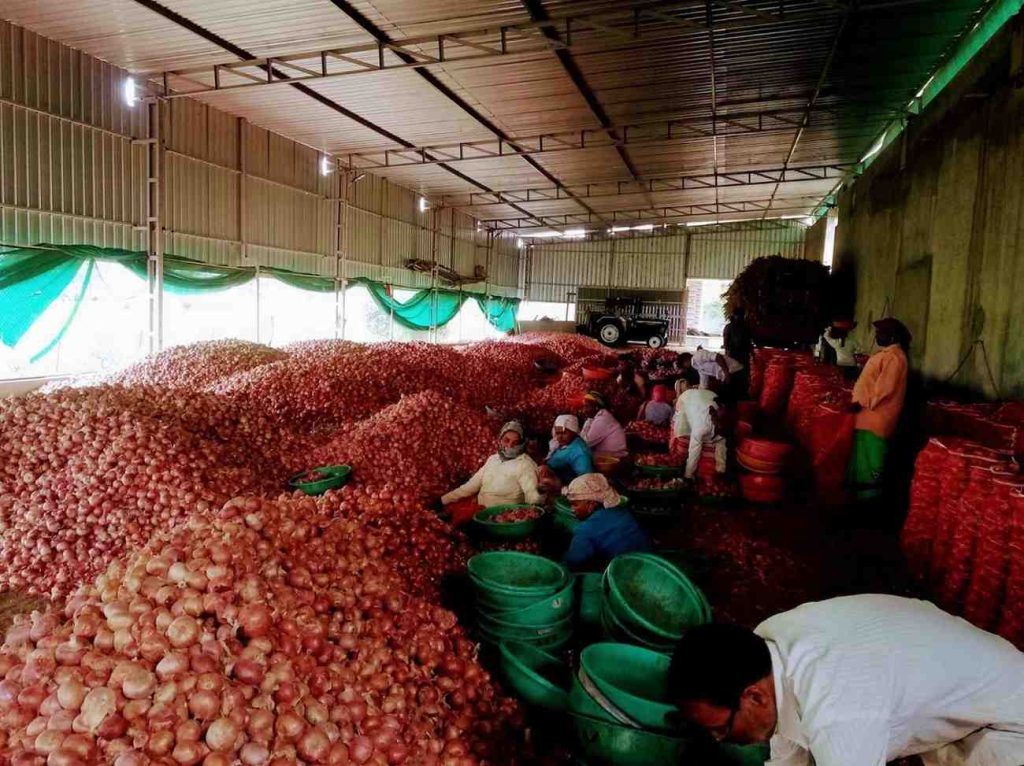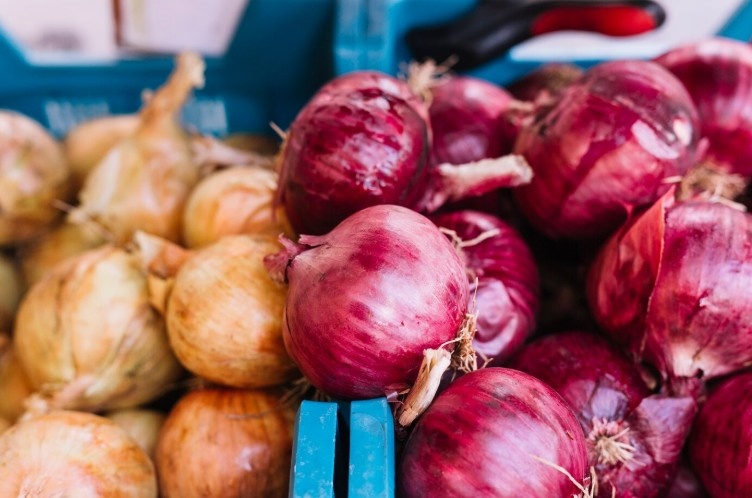Onion prices in Nashik today vary based on quality and location. Retail rates in local markets are roughly ₹25 – ₹30 per kg, depending on onion variety and supply conditions. In the Lasalgaon (Niphad) mandi, the wholesale price for onions is around ₹13 per kg (≈ ₹1,300 per quintal), reflecting current trade rates. At the Nashik mandi, the wholesale price is also approximately ₹13 per kg (≈ ₹1,300 – ₹1,650 per quintal), though rates can fluctuate with arrivals and market demand. Prices continue to shift due to seasonal supply changes and demand trends.
Maharashtra is the top onion producer in India, making over 40% of the state’s total output. Nashik is famous for its dark red, semi-red, and Bhima Super onions, known for their strong taste, good storage life, and high demand in the market.
This article gives you the latest onion prices in Nashik for 2026, along with trends, price changes, and how the supply chain affects the market.
Current Onion Rates In Nashik
Nashik. India’s onion hub, current market prices show variations across different varieties, including Dark Red, Light Red (Garva), and Bhima Super onions. The rates fluctuate based on quality grades and size classifications like small, medium, and large.
According to recent market data from major trading centers, here are the current rates:
| Variety | Price per Kg (₹) | Price per Quintal (₹) |
|---|---|---|
| Red Onion | ₹23 – ₹30 | ₹2,300 – ₹3,000 |
| White Onion | ₹30 (Max.) | ₹3,000 (Max.) |
| Other Varieties | ₹17 – ₹22 | ₹1,700 – ₹2,200 |
Price Source: IndiaMART, ExportersIndia.com, KisanDeals, Local Market Price
These rates reflect both the wholesale and retail markets. The current market shows steady supplies from major growing areas around Nashik. They are favorable for both farmers and consumers, with premium-quality onions bringing better rates.
The Rates Of Onion According To Nashik Regions
Nashik’s popular onion varieties include Lasalgaon, Agrifound Dark Red, Agrifound Rose, and Nasik Red N-53. Each variety has unique characteristics, from Lasalgaon’s export quality to Agrifound Dark Red’s excellent storage life.

Here is a table of Nashik’s popular region pricing structures for Onions per kilogram and per Quintal:
| Region | Price per Kg (₹) | Price per Quintal (₹) |
|---|---|---|
| Lasalgaon | ₹13.70 – ₹15 | ₹1,370 – ₹1500 |
| Niphad | — (grouped with Lasalgaon) | ₹1,370 |
| Dindori | ₹7.51 – ₹26.11 | ₹751 – ₹2,611 |
| Malegaon | ₹12 | ₹1,200 |
| Pimpalgaon | ₹14.25 | ₹1,425 |
| Satana | ₹12.80 | ₹1,280 |
| Sinner | ₹12.75 | ₹1,275 |
| Yeola | ₹11.00 – ₹14.26 | ₹1,100 – ₹1,426 |
| Chandvad | ₹13.50 | ₹1,350 |
Price Source: napanta.com, kisandeals.com, commodityonline.com
The price variation across regions reflects local market and transportation costs. Lasalgaon, Asia’s largest onion market, typically has premium prices and influences rates across other regions.
There are also varieties that are cultivated around a year in summer, kharif, and late kharif, like Nasik Red N-53. However, these regional price differences help farmers and traders decide where to sell their produce.
Note: The prices mentioned in the table are approximate and can fluctuate based on market and climatic conditions.
Impact on Farmers and Traders
When onion prices change in Nashik, it affects both farmers and traders in different ways. For farmers, high prices mean better earnings, allowing them to buy better farming tools and improve their methods. But when prices fall, they struggle to cover their farming costs.
Traders also face challenges with changing prices. When prices are high, fewer people buy onions, which means less business. When prices are low, they sell more but earn less profit on each sale. This makes it difficult for them to plan how many onions to stock.
Both farmers and traders have to handle these price changes. Staying Updated to sudden market shifts can keep both of them running smoothly.
Future Predictions Of Onion Rates In Nashik
The rise and drop in onion prices depend on the season and market demand. Future predictions for onion prices in Nashik indicate a rise due to reduced plantation and damage caused by recent rains.
In the Lasalgaon wholesale market, the prices went high to ₹5400 per quintal, according to the Times of India data. The next growing season might see less onion production because of bad weather, which could push prices even higher.
To keep prices steady in the future, we need better water systems, stronger onion varieties, and good storage facilities. Government help is mandatory to remove export charges, and supporting farmers could also help keep prices stable.
Factors Affecting Local Prices Of Onion
The rates of onions in Nashik depend on several key factors that work together to influence market rates. Understand the below factors that can help farmers, traders, and consumers make better decisions.

Here’s a detailed look at what affects onion prices in Nashik:
1. Weather Condition
Heavy rains, droughts, or unusual temperatures can damage onion crops or slow their growth. When the weather is bad, farmers get fewer onions from their fields, increasing prices. Good weather usually means more onions and lower prices.
2. Quality Grading Of Onion
The quality and size of onions determine their price. Big, dark red onions get the highest prices because they look better and last longer. Medium-sized red onions sell for middle-range prices. Mixed-size onions sell for lower prices as they’re less uniform.
3. Production In Nashik
The amount of onions grown in Nashik affects prices directly. When farmers grow more onions, prices usually go down. But if fewer farmers grow onions or if crops fail, less supply leads to higher prices.
4. Transportation Issues
Moving onions from farms to markets can be difficult. Problems like bad roads, high fuel costs, or lack of trucks can increase transportation costs. These extra costs make onions more expensive in the market.
5. Storage Availability
Good storage helps keep onions fresh longer. Farmers sell quickly, sometimes at lower prices, when there aren’t enough storage facilities.
6. Market Demand
During festivals or special seasons, demand increases. If there aren’t enough onions to meet this demand, prices rise even more.
7. Import/ Export Policies
Government rules about selling onions to other countries affect local prices. When exports are allowed, prices often go up because some onions are sold abroad. Import rules also affect how many onions come from other places.
More Topics Like This:
Final Take: Onion Prices in Nashik Today Range from ₹17 to ₹30 per Kg
Red onions in Nashik are currently priced between ₹23 to ₹30 per kg, while white onions are slightly higher, around ₹30 per kg. Other varieties, like Pearl, Garwa, and Saudi Quality onions, range from ₹17 to ₹22 per kg, depending on quality and local demand.
Maharashtra continues to be the largest onion-producing state in India, and Lasalgaon near Nashik stands out with the largest wholesale onion market in Asia. The region is well-known for dark red, semi-red, and Bhima Super onions, which are highly sought after by traders and consumers alike.
Onion prices can fluctuate based on weather conditions, crop quality, market demand, and storage availability, so buyers and sellers should keep an eye on daily market trends.
FAQs
Today, the price of 1 kg of onion in Nashik ranges from around ₹25 to ₹30, which is based on diversity and mandi space.
Reversing the current wholesale market prices, the Lasalgaon onion market rate today is around ₹ 13.7 per kg.
Depending on the recent market data, the rate of Pimplegaon onion is about ₹ 14 to ₹ 21 per kg, depending on quality and variety.
Based on recent market transactions, the Pimpalgaon onion market rate today is approximately ₹21 per kg.
The price of wholesale onions in Nashic is widely different today, usually due to various onion types and market demands, ranging from 7.5 to ₹ 26 per kg.
Today, onion prices vary greatly across India, in some northern markets, ₹ 12 to ₹ 18 per kg, at least, ₹ 44+ per kg, Kerala in southern states shows the difference of regional supply.